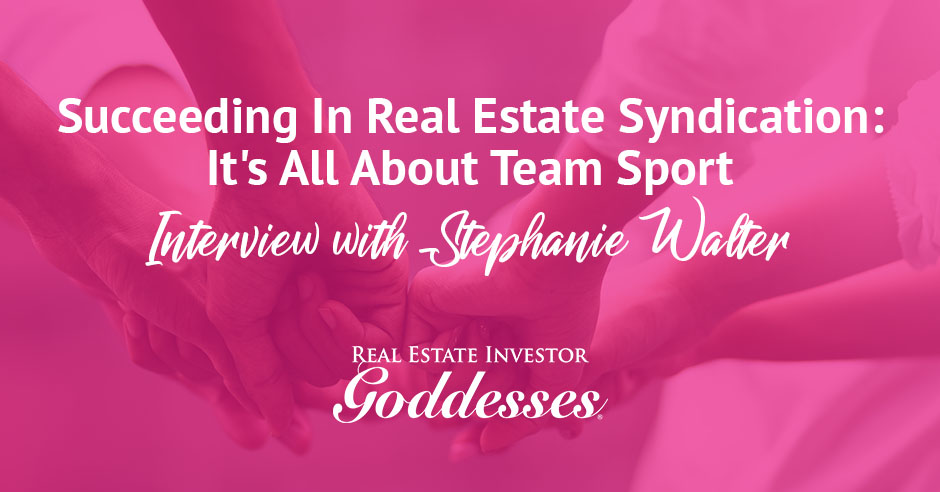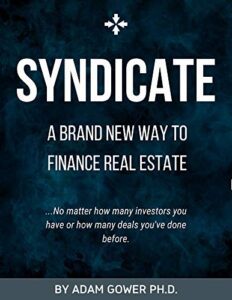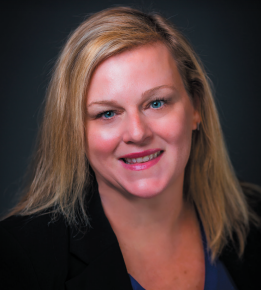
You don’t have to do everything by yourself, and you shouldn’t! This applies to any endeavor you may have or any industry out there, including real estate syndication. It’s a team sport. In today’s episode, Monick Halm introduces Stephanie Walter, the Founder of Erbe Wealth. Stephanie talks about how syndication investments can give you cash flow, great returns, and fantastic tax benefits. The crucial factor is to figure out what you like and what you’re good at. Focus on that rather than doing everything yourself. Want more syndication tips? Tune in!
—
Watch the episode here:
Listen to the podcast here:
Succeeding In Real Estate Syndication: It’s All About Team Sport With Stephanie Walter
On this show, I interview amazing badass women real estate investors. I am super excited for this episode’s guest, who is certainly no exception. Her name is Stephanie Walter. She’s the CEO of Erbe Wealth, a capital raiser. I asked her, like “What does Erbe mean?” It means legacy in German. She says it’s all about building a legacy. She’s a capital raiser, syndicator and real estate investor.
She retired and sold her insurance agency of sixteen years by following the key principles she teaches professionals to use. She teaches professors, professional people to unlearn what most of them have been wired to think about money. She’s all about re-educating people on attaining lasting love. A woman with my heart, I’m a big fan of those too. She’s a gateway between professionals and well-betted deals. She lives in Colorado with her husband and son. I’m super excited to welcome her to this show. Welcome, Stephanie. How are you?
I’m great. Thank you so much for having me.
It is my pleasure. Thanks for being here. Start at the beginning. How did you get started in real estate investing?
I was working in a W-2 job and decided many years ago to quit because I was tired of a lot of things but I was tired of getting the 2% raise every year. I talked to my father, who was alive at the time and was like, “What should I do?” He was like, “You could stay and you know what the next 30 years are going to look like or you can go out on your own and make it happen for yourself. You need to make a choice and act on it.” I quit. I started my insurance agency at that time. Around that same time, I always loved real estate. I didn’t have a great education in real estate.
I did a lot of investing in single-family homes where I thought there were areas of Colorado that were growing and coming around essentially. I bought little single-family homes, a duplex, a small commercial property. My idea was to keep these until I’d retired after 30 years and retire off the rent that these provided. One of my friends had known I was interested in real estate and had invited me to a bootcamp. We went to the bootcamp. It was about investing in apartments. I was blown away at that bootcamp. They explained what syndication was, which is a group of people buying a piece of real estate that no one could do on their own.

Real Estate Syndication: Real estate syndication is a team sport.
I was sold, hook, line and sinker. I thought it was a fantastic idea. I went full force at that time. That was 2016. You can’t wing it in the syndication world. You had to drill down and get a good education, which is what I did for the next two years then I closed on my first syndication in 2018. I decided after that that I never wanted to do it ever again by myself. I met my partner through our networking and groups and what we were involved with.
He’s excellent at finding a deal. He wondered if I would be interested in raising money and that was our first deal together. We’ve done eight deals since and haven’t looked back. In fact, I was able to sell my agency in July of 2021 because my passive income has replaced my business income. I could be retired but I wouldn’t know what to do with myself. This is what I love to do and that’s what I’m doing.
Tell me about the first deal you did because you said that you do that without any partners.
The first one I did without any partners because I did have a pretty good net worth because I had invested in a lot of single-families. I was always raised, “Do it yourself.” I didn’t understand that this truly is a team sport, this type of investing. It was in Fort Collins, Colorado. It was a bit of a specific type of investment. It was a fraternity, which a lot of people are like, “You’re crazy, girl,” but no. It’s been a great investment and in fact, I got off the phone, no lie. We have had it on the market and we were negotiating back and forth with the buyer. We came to terms to go under contract to sell it because we’ve had it for three years and essentially doubled my investors’ money.
It was a lot of work. There are many angles of going into syndication. You have to do the finance, figure out the financing piece. All the due diligence, which is an enormous amount but the biggest thing for me always was raising money. Everybody and probably you felt the same way that you wanted to get that first deal done but then when you get the deal done and you have investors in it, you’re like, “Now, what’s next?”
You were like, “This deal had better performer. That’s the last time these investors are going to work with me.” There’s an enormous amount of pressure on that particular deal. Thankfully, everything went well with it. I am selling it because I want to work with groups of people where I know like my partner is the best operator I know. I’m very good at capital raising. You have to know your lane in this business and know it and be good at it.
You could stay and know what the next 30 years will look like, or you can go out on your own and make it happen for yourself. You need to make a choice and act on it. Share on XThat’s the lane I chose too. They have a full racing side. I’m so fascinated. I want to rewind. You got me at fraternity. I’m assuming it’s a type of student housing that you’ve bought. What are the stats on this particular property? Was it multifamily that was being used as a fraternity? Was it a big house that had a lot of rooms? What is it exactly?
It’s interesting. Again, a lot of things fell into place for me. I’ve since learned a lot more about fraternities after owning one but it’s essential that you know the culture and the climate of where you’re investing in a fraternity house. CSU up in Fort Collins, the fraternities have to be very accountable to the university. There can be no official parties at these locations. They’re not supposed to be alcohol. There probably is but essentially, this is a house that was built in the early ‘20s, it’s a gorgeous house.
Initially, it was a rancher’s home up in Fort Collins. In the ‘40s, they donated it to the university and the university at that time made it into a fraternity house. It had been a fraternity house from the ‘40s until the ‘80s or early ‘90s. Someone had been living there as a regular house and it was reconverted back into fraternity housing by the prior owners and I bought it from them.
Since, what have you been working on?
We do a little bit of everything. Our first deal with my partner was a retail center. Prior to COVID and it’s in Florida, that’s where he lives and that’s where everything, except one of our properties is located in Waco, Texas but all the other ones are located in Florida. If the numbers make sense, we look at it but largely, it’s a value add. That’s a space we want to be in but as you know, in this time now, it’s hard to find good investments that make sense for the investors to get involved with.
We have done a development in 2021, an interesting development of 24 luxury homes in Davie, Florida. They’re $4 million homes. What’s cool about them is they’re completely green. They’re completely off-grid homes. That was fun but different. Everything else for us now has been a value add. That’s what we look for, multifamily apartment value add.

Real Estate Syndication: You must know the culture and the climate of where you’re investing in.
Switching gears. I want to ask you my favorite question because we learn so much more when things don’t go right when they do. What would you say was your biggest mistake? What have you learned from it?
The biggest mistake for me, everything did work out well with this fraternity house but had I rewind to go back, I’m not certain that I would’ve gone through that all by myself and was intent on getting that thing over the finish line no matter if I was alive or dead. That’s a big mistake. Another mistake is, I don’t know if it’s so much a mistake but raising money and knowing what works and what doesn’t work. There’s been an enormous trial and error. I’ve come across a couple of good books and I’m like, “I wish I would have had this book when I started raising money.” A lot of mistakes. Those are the ones that come to mind.
What are the books that you’ve found that had a different view?
I read an interesting one. It’s called SYNDICATE and the writer of it is Dr. Adam Gower. Also, Hunter Thompson, who wrote Raising Capital for Real Estate. They’re both fantastic books because I came from the mindset of when I learned to do syndications, people were like, “If you find the deal, the money will come.” There hasn’t been anything further from the truth than that.
The money is there but you have to know how to access it. Convince people to part with their funds but invest with you. I feel comfortable investing in that opportunity with you. It is a skillset that must be learned like sales training. I remember before with our first multifamily, this was 2016 and I had to raise $2.5 million for that deal and I hadn’t raised it. I raised a little bit for something before but it was terrifying. What I had learned about making it about the other person, was like, “How do you approach it and how can you have those conversations and get to a win-win and that people feel comfortable investing with writing checks minimum $50,000, writing large checks?”
When I had that shift, I remember there was a weekend conference. I went home. I was walking my dog and one of my neighbors said, “You’re in real estate, right?” I said, “I started. Come walk.” She’s like, “I want to ask you a question.” “Walk with me.” We walked around the block with my dog. By the time we were around the block, she wanted to invest $140,000. I was like, “This is crazy.” It wasn’t about me. That was the thing I learned. It’s not about me. It’s about them and how can I solve that problem? For me, it helped them meet their device. What’s been your main takeaway around capital raising?
The money is there, but you have to know how to access it, convince people to part with their funds, and invest with you. Share on XI have many. I’ve been reading this book. A mindset change. People that have money and granted I look at myself now as someone who wants to get the information out to more average-ish people. Not the wealthiest people. I want to let people know how that they can get into this type of investing, which is different than anything they’ve ever heard of. It’s different than the 401(k) or owning your landlord’s policy or anything like that. The coolest thing has been, I thought the same as you, my first race was smaller than yours or my second one was $1.5 million.
I was like, “How in the world am I going to get up that hill?” I don’t know if it’s ever going to happen. The mindset of looking at what you’re doing is something that people want. You are helping them and changing their lifestyle. The coolest thing so far is I had someone who came to me by a referral. I met him at a Starbucks and he said, “Who do I make the check out to?” He wrote me a check for $500,000. That was the coolest thing that’s happened so far.
Sometimes I asked before, it’s like, “Do you have questions you want me to ask you?” One of the questions you wanted me to ask you that were there and I thought, “This is an intriguing question. I want to know the answer to this.” What do you have to say and the audience will too. The question was on reasons to not put your money in a 401(k). What are the reasons not to put your money in a 401(k)?
This is quite a controversial thing that I say because I get called on it a lot. What I’m saying is the wealthy people I work with. I’ll look at their financial statements and few of them have 401(k)s. If they do, they’re probably maybe 10% of their assets. The other 90% of their assets are invested in syndications and in cashflow that is generated for them. It goes back to a book that I read that is good. It’s called Killing Sacred Cows. It has a startling title but it’s a great book about mindset. Truly, to become wealthy, you have to change your mindset. We’re all taught that we’re supposed to accumulate our money. The 401(k), that’s one way of accumulating your money.
The way I was accumulating my money was I was buying single-family rentals and sitting on all the equity and cashflowing very little on these properties. A wealthy person wants their money working for them and giving them cashflow. That needs to be a mindset change, which I will call that utilization. The wealthy people are looking at using their money that their money is a tool for them. Like when it goes into a 401(k) or anything like that. It sits and it’s over there and there are fees that you’re paying. There are many things that are out of your control. It’s not liquid. It doesn’t pay any cashflow. The biggest thing is the tax rates are lower now than they’ve ever been in the history of the country.

Real Estate Syndication: Get some of your assets into investments that will give you cash flow, great returns, and fantastic tax benefits.
You know darn well that in 30 years when you go to get it, that money is going to have a tax. They’re going to be taxed. We don’t know how much. That would also be pretty unacceptable to a wealthy person. Those are the big reasons. I’m not saying that if you have a 401(k), ditch it. I’m saying you need to be aware that maybe that’s where you keep some of your assets but let’s get some of your assets into investments that are giving you cashflow, giving you great returns and are giving you fantastic tax benefits. Once you start doing that and I’m sure you have too is once people get into an investment and they see that it’s going well and they get all these great things that they weren’t anticipating, the next time they’re in and they’re in for probably double what they were in for the first time.
I wouldn’t say people shouldn’t have a 401(k) at all but that’s your only strategy for retirement. Limiting yourself a lot. I asked about the biggest mistakes. I want to ask the flip side. What are you most proud of?
I’m most proud of my family. I was able to have my child pretty late in life. I feel like I was a bit of a late bloomer. I’ve learned about syndications when I was 45 and changed the whole way I was strategizing my retirement and everything and managed to retire in five years as opposed to working for another 20, 25 years. Those are things I’m proud of.
To what do you attribute your success?
Mindset. I’m a big mindset person. I’m an optimist but I have heard a quote. I remembered the concept, which is, “You had some of this in you and I have entrepreneurship in me.” My father was an entrepreneur. He did several businesses but his father, my grandfather, came straight over from Germany with nothing and became an entrepreneur too. Seeing people go out and build businesses rather than working for a W-2 job. Being able to see that made me see that something different was possible for me.
It does help to have that in your line. My parents were W-2s but my grandmother was from Haiti but she owned a chain of department stores. Her father was an entrepreneur, quite successful in the country. It’s in your bones but for those of you reading, “I don’t have that family,” if you know the wire, the pull towards it then you can be the beginning of that line for your turn. What advice do you have for a woman who’s starting out in this field?
Figure out what you like and are good at, and focus on that rather than doing everything yourself. Share on XGet educated, find a good group. My number one piece of advice is to find a mentor. Find someone who is doing it the way you want to do it and has success because in this field sometimes people can puff some smoke up your skirt and not be who they are. If you legitimately find someone that’s doing what you want to do, every person I’ve ever been around in this field is so happy to help and happy to not do it for you but tell you how they did it and give you advice and mentor you through it. I got insanely lucky in this business. I had a lot of good mentors. My first one was a woman. In the course of her career, I believe she’s raised over $300 million. When I got to know her better, I was like, “I want to be you. Tell me how to do that.”
What do you wish you’d known at the beginning that you now know?
That this is a team sport, for sure. Not to go it alone and try to figure out what you like, what you’re good at then get good at that rather than try to do everything yourself.
Before we get to our famed end of show trinity, which is a brag, gratitude and a desire. How can people connect with you and find out more about what you do?
The best place is my website, which is www.ErbeWealth.com. there’s a great deal of content. We put up an investment report, the five reasons that passive investing might be for you but you can look around. There are a good articles and video podcasts, lots of interesting stuff.
Now it’s time for our trinity. What is one thing you’re celebrating now? What is your brag?

SYNDICATE: A Brand New Way to Finance Real Estate
My brag in 2021 is I am celebrating that we closed a property. I’m bragging about that one because it’s awesome to close the deal. We close probably 2 or 3 a year. This was our second one for the year and it takes a lot of work to get it across the finish line. I’m proud of that.
What is one thing you’re grateful for?
I am grateful for my family, for my health now and managed to keep a positive attitude during these times that have been a little bit challenging.
Last but not least, what is one thing you desire?
I struggle with this one because I’ve gotten to the point now, I could be retired but trying to be able to decide what my life looks like on a daily or weekly basis as I don’t have a business where I have to be working 12 or 14 hours a day. It’s balance, truly. That’s what I desire.
Shall your desire be or so much better than you can imagine.
Thank you.
Stephanie, thank you so much. You’re amazing. You can connect with Stephanie Walter at ErbeWealth.com and connect with me at REIGoddesses.com. Come on and find out about our education, mentorship programs, our events, our investor club where you can get into our passive investing opportunities. Connect with me there and don’t forget to subscribe and like this show so that you will never miss another amazing interview. Thanks and bye.
Important Links:
About Stephanie Walter
 Stephanie Walter, is the CEO of Erbe Wealth, a capital raiser, syndicator, and real estate investor. She recently retired and sold her insurance agency of 16 years by following the key principles she teaches professionals to use. She teaches professional people to “unlearn” what most of us have been wired to think about money and re-educating people on attaining lasting wealth.
Stephanie Walter, is the CEO of Erbe Wealth, a capital raiser, syndicator, and real estate investor. She recently retired and sold her insurance agency of 16 years by following the key principles she teaches professionals to use. She teaches professional people to “unlearn” what most of us have been wired to think about money and re-educating people on attaining lasting wealth.
She is a gateway between these professionals and well-vetted deals. Stephanie lives with her husband and young son in Colorado.
Love the show? Subscribe, rate, review, and share!
Join the Real Estate Investor Goddesses Community today:





